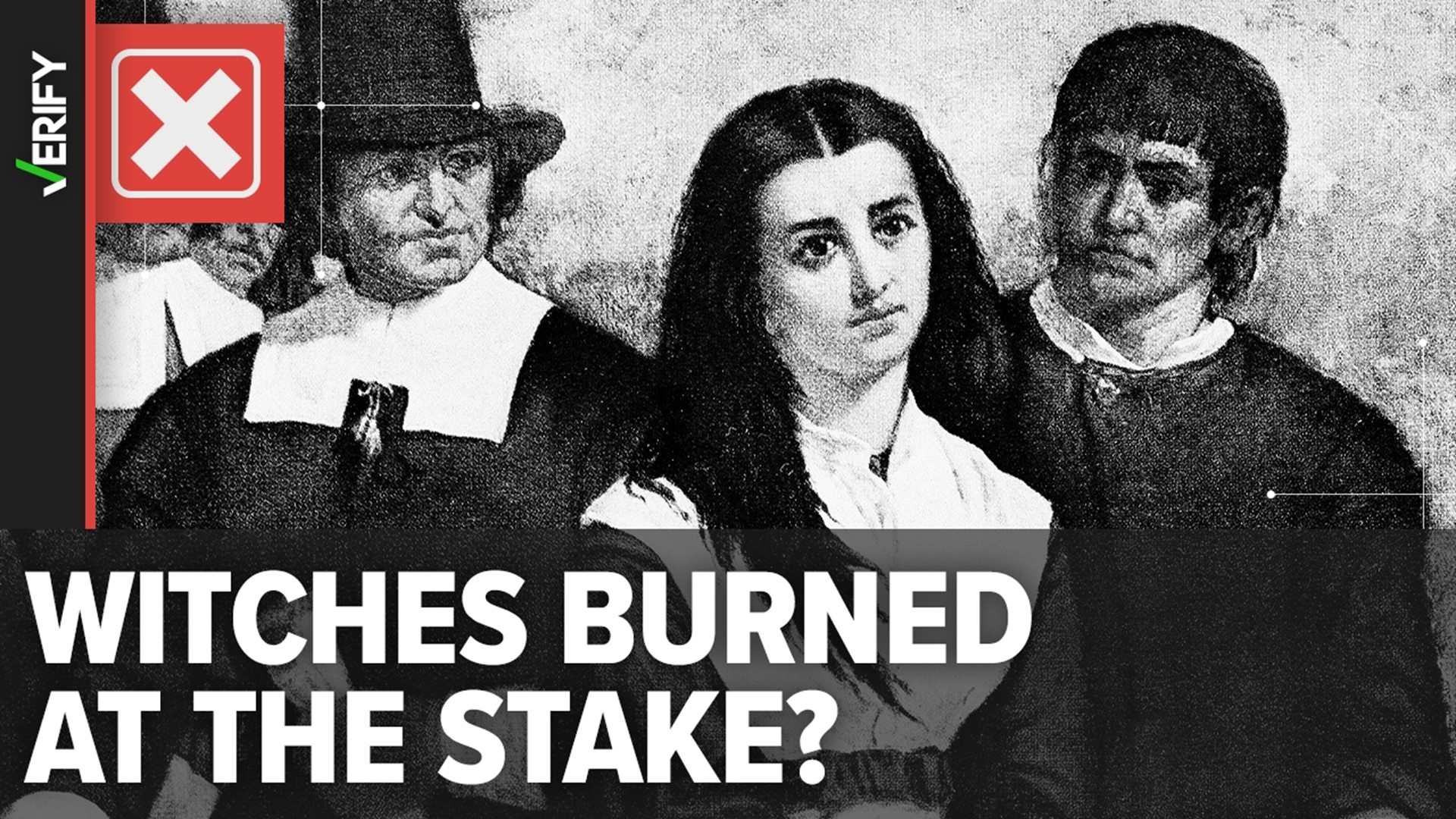In the late 1600s, hundreds of people were accused of practicing witchcraft in the Massachusetts Bay Colony.
Twenty of those accused witches were executed during what is now known as the Salem witch trials.
Imagery of people being burned at the stake is often associated with the Salem witch trials. But posts shared on social media over the last several years claim that people convicted of witchcraft in Salem did not actually meet this fate.
THE QUESTION
Were witches burned at the stake in Salem?
THE SOURCES
- Massachusetts state government
- New England School of Law
- Destination Salem, the office of tourism and cultural affairs for Salem, Massachusetts
- State of Connecticut Judicial Branch
- Emerson Baker, Ph.D., professor of history at Salem State University and expert on the Salem witch trials
- Alison Games, Ph.D., professor of history at Georgetown University
THE ANSWER
No, witches were not burned at the stake in Salem.
WHAT WE FOUND
Contrary to popular belief, people convicted of witchcraft in Salem and throughout colonial New England were not burned at the stake, historians told VERIFY.
Nineteen people were executed by hanging during the Salem witch trials, the Massachusetts state government says on its website. One man accused of witchcraft was pressed to death under heavy stones and at least one person died in jail, according to the New England School of Law.
In England and its colonies, such as Massachusetts Bay, witchcraft was considered a felony and tried in criminal courts, Emerson Baker, a history professor at Salem State University and an expert on the Salem witch trials, explained. Under English law, the penalty for such a felony was death by hanging, he said.
Alison Games, Ph.D., professor of history at Georgetown University, agrees.
“Under English law, witches were hanged (like other felons),” Games said. “English colonies used English law, thus witches in places like New England were hanged.”
Though Salem is the most infamous location of the witch trials, it’s not the only one that took place in America. In 17th-century Connecticut, for example, dozens of people were accused of witchcraft and more than 10 were hanged, the state’s Judicial Branch says on its website.
The misconception about accused witches being burned at the stake in Salem likely stems from punishment practices in Europe.
During witch trials that took place across continental Europe, tens of thousands of people accused of witchcraft were executed and many were burned at the stake, according to Baker. Games also said “witches in most jurisdictions in Europe” were burned.
That’s because accused witches on the European continent were often tried for heresy in ecclesiastical, or religious, courts. The punishment for committing heresy as a crime against the church was burning at the stake, according to Baker and Destination Salem.
The erroneous information about witches in colonial New England being burned at the stake can also be traced back to a U.S. congressman’s 1849 speech, according to Baker. Virginia Congressman Henry Bedinger was angry with his Massachusetts colleagues who were trying to abolish slavery, so he leveled his own criticism at the state.
“Essentially, he said…you folks have a really proud history up there, too, where you used to burn witches and Quakers like cordwood,” Baker said.
Baker provided the following excerpt from Bedinger’s speech:
“Massachusetts is a great state, sir — a very great state, indeed is Massachusetts. She could not well be anything else, sir, for she has Boston, and Bunker Hill, and the Rock of Plymouth! There the Mayflower landed the Pilgrims; and there witches and Indians and Quakers and Catholics, and other such heretics, were in the brave days of old, burned, literally, by the cord!”
The speech was included in a declamation book used in classrooms and colleges. That book became so popular it was published in many editions through the second half of the 19th century, Baker said.
“Many American kids in the 19th century in school would have recited the speech. It would have kind of spread that misinformation,” he said.
This story is also available in Spanish / Lee este artículo también en español: No, las brujas no fueron quemadas en la hoguera en Salem

